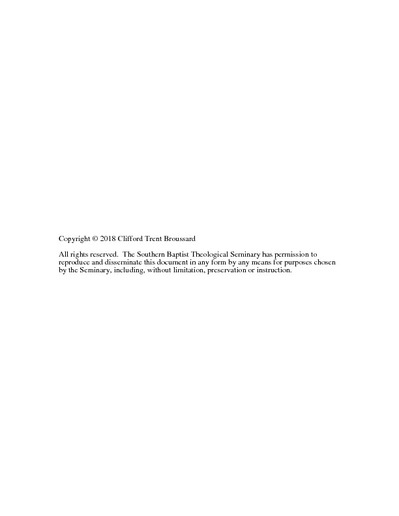Incorporating Persons with Special Needs into the Worship Ministry of the Church
Abstract
This thesis argues for and provides a model for the full inclusion of individuals with special needs as co-laborers in the worship ministry of churches. Full inclusion means moving beyond simply accommodating ministries and facilities to minister to individuals with special needs. Full inclusion is encouraging each regenerate individual to use their own giftedness to minister to the body of Christ. As the church and world see individuals with varying abilities, both the outcast and the privileged serving Christ along side one another, the church will be edified, God will be glorified, and gospel of Jesus Christ will be proclaimed.
Chapter 2 traces the history of disability in America. Discrimination is found in early immigration laws as well as in citizenship and voting rights. The cultural response vacillated between a desire to care for and protect those with disabilities and a movement to protect society from people with disabilities. Eugenics in America was a movement to prohibit reproduction and ultimately remove people with disabilities from society. Eventually, legal reforms were enacted which slowly created opportunities and granted civil rights to people with disabilities. The ADA and IDEA mandated equal access in public and in education. These laws were the catalyst of a seismic cultural shift in public education which itself transformed from an institution of exclusion and segregation to a place of full inclusion and acceptance.
Chapter 3 examines the church’s response to disability and outlines a biblical support for inclusion. Multiple surveys are cited which reveal a participation gap in church involvement between those with disabilities and those who have no disability. A lack of hospitality and a lack of theological understanding of disability are recognized as continuing issues in the church. Biblical warrant for inclusion is established through the doctrines of imago Dei and spiritual gifts as well as the Great Commission. People with disabilities are made in the image of God and those who are regenerate are given gifts for ministry to edify the church. The call to go and make disciples is a call inclusive of those with disabilities.
Chapter 4 offers practical suggestions for engaging people with disabilities in the corporate worship gathering of the church. A model worship is designed, and appropriate accommodations based upon best practices from public education are suggested. Specific accommodations for both physical and cognitive disabilities are offered. Chapter 5 expands the scope of accessibility in worship to include worship leadership. Similar accommodations employed for accessibility in worship participation are proposed for accessibility in worship leadership. Chapter 5 concludes with a call for full inclusion in worship ministry. Chapter 6 summarizes the previous chapters, draws implications, and suggests areas for further research.

